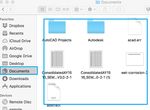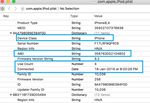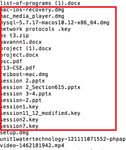OS X Artifact Analysis - International Journal of Recent ...
←
→
Page content transcription
If your browser does not render page correctly, please read the page content below
International Journal of Recent Technology and Engineering (IJRTE)
ISSN: 2277-3878, Volume-7, Issue-6S, March 2019
OS X Artifact Analysis
Bhavana Maddu, P.V.R.D Prasad Rao
Abstract--- Recent day’s apple computers have been trend to
new generation. As the usage of apple products is increasing day
by day, the market has increased more for apple devices. Apple
computers has default MAC OS operating system. Even though
mac is secure it also experiences cyber related crimes. The
cybercrimes across the world has been increased more but there
are limited open source forensics tools for MAC along with
different operating systems to analyse the cybercrime. A Digital
forensic investigator collects the atrifacts from the evidence and
analyse using digital forensic techniques. Mac uses different
methodologies for investigating a cybercrime. Artifacts plays key
role in analyzing the crime by finding the traces. Artifacts are
related to system, user and third party applications (chrome,
Firefox, Skype, Team Viewer etc.) This research paper helps to
find out the black listed software’s that are installed in Mac
computers.
Keywords: Mac OS X, OS X forensics, Mac forensics, Digital
forensics, Artifact Analysis.
1. INTRODUCTION Table 1 Comparison
MAC OS is the operating system that is only used on
1.2 Importance of Mac computers
Apple systems. Earlier windows operating systems are the
most used among MAC, Linux but now usage of MAC has Mac OS does not have any serial keys you can install the
increased. In recent years incidents related to Mac OS any number of times on the systems. Mac computers are
environment has increased due to the usage of MAC more secure than windows because Mac is UNIX based
computers is continuously increased by individuals and operating system. Due to this Mac OS is less prone to
business people. The Apple Macintosh (or Mac) was first attacks than compared to windows. Apple itself develops
introduced to the public in 1984. In 2001 March, a new both hardware and software so these are less prone to
version of Mac OS has released by Apple which is called system crashes compared to Windows. Apple Company
Mac OS X here X means 10. It has been marketed as Mac takes care of their computers look and internals are
OS X till 2012 then it is marketed as OS X till 2016 and constructed beautifully. Apple releases its new version for
later it is marketed as macOS. It is a UNIX’S based free to download and install for the supported Macs. It has
operating system[1]. Apple has named their operating pre-installed software’s like FaceTime, Numbers, iMovies,
systems after big cats until Mac OS 10.8 MOUNTAIN pages, GarageBand etc[3]. Mac computers have an App store
LION and from OS X 10.9 mavericks it started naming after which contains different Apps for free and paid. Every
places in California. Even the operating system is more download from App Store requires an admin authenticity to
advanced than earlier versions, Apple software has allow the application to download. Mac provide different
maintained same ease-of-use for people. features like Time Machine, File Vault2 and many others.
Time Machine is used to take backup of their system all you
1.1 Comparison between Mac, Windows and Linux [2] need to do is connect a drive and turn on Time Machine.
Whenever the drive is accessible it automatically takes the
backup of the system. File Vault2 which is used to encrypt
the whole disk to provide security.
1.3 Phases of Digital Forensics
Different methodologies are needed for digital forensic
investigator to investigate the case related to Mac. The
digital forensics process has five phases to investigate the
case. They are Identification & Acquiring, Preservation,
Analysis, Reporting and Presentation[4].
Identification & Acquiring: The digital forensic
examiner who is present at the cybercrime scene should be
Revised Manuscript Received on March 10, 2019. well trained to identify the evidence, where it is stored, how
Bhavana Maddu, M.Tech Student, Department of Computer Science
and Engineering, Koneru Lakshmaiah Educational Foundation,
Vaddeswaram, Guntur District. (bhavana.kdy@gmail.com)
Dr. P.V.R.D Prasad Rao, Professor, Department of Computer Science
and Engineering, Koneru Lakshmaiah Educational Foundation,
Vaddeswaram, Guntur District. (pvrdprasad@kluniversity.in)
Published By:
Blue Eyes Intelligence Engineering
Retrieval Number: F02090376S19/19 ©BEIESP 26 & Sciences PublicationOS X Artifact Analysis
data is stored in the evidence and what operating system is cybercrime. These Artifacts plays a major role in identifying
used. The examiner need to identify the appropriate the traces and root cause of a cybercrime.
recovery methodologies and tools to be used to extract the
data. The examiner needs to acquire the evidence properly 4. EXPERIMENTAL SETUP
in the presence of authority and conduct imaging or cloning The laboratory setup that is used for this forensic analysis
to the evidence. is MacBook Pro with operating system macOS High Sierra
(10.13.4) , Processor 2.6 GHz intel core i5, Memory 8 GB
1600 MHz DDR3, Storage 256 GB. The application that is
used for this analysis is Xcode version 9.4.1, TextEdit[1].
5. METHODOLOGY & RESULTS:
Digital Forensics mainly focuses on three stuffs like data
theft, malware infection, and deleted data whenever the
Figure 1 Digital Forensics Phases cybercrime has occurred. Data theft can be occurred by USB,
mail attachments etc. if a data theft is occurred then the digital
Preservation: The evidence should be preserved by forensic investigator mainly focuses on the USB logs, mail
ensuring its integrity and chain of custody. All the steps logs to identify from where the data has been theft. If malware
should be documented while capturing the data and any has infected to system then the digital forensic investigator
changes made to evidence also be documented. At the end mainly focuses on Activity monitor and by commands. If the
integrity of data should be proved in the court of law. data is deleted from system the digital forensic investigator
Analysing: In this phase the data present in the evidence mainly focuses on trash, Time Machine backup, tools.
is examined, processed, interpreted and the deleted data is
5.1 Scenario
recovered. It produces a final conclusion like how the
incident has occurred based on the evidence that has found The MNC firm called WebEx which works in the area of
at the crime scene. iOS application development. IT audit team found certain
Reporting: Report means producing how the crime has black listed software’s & devices are installed in their
occurred in a document format. This document contains the workstations. The legal team conduct a raid & seize the
process used to analyse, tools used to recover, chain of potential evidence from the premises. In response to the
custody etc. The report should be in simple and complaint of data theft, forensic investigation file of one of
understandable manner. the machine was given to the accused was seized. Now the
Presentation: The evidence and the report should be task of forensic analysts to find out the potential artefacts to
produced in the court of law in an acceptable manner. The prove the scenario.
judge should be able to relate the original crime and the 5.1.1 System Logs
report that is submitted to the court and be able to punish the
System log files main folder
offender.
System log file folder contains all the log files related to
the user activities[6]. This is the path /var/log which displays
2. LITERATURE WORK
all the log files.
Dr Digvijaysinh Rathod – research paper has mainly
focused on the safari artifacts like browser history, recent
web search, and last sessions.
Philip Craiger, Paul K. Burke - research paper focused
more on the available artifacts from the system and user
data. But the user deleted logs and history are necessary to
recover.
Dr Digvijaysinh Rathod- in this research paper he mainly
focused on the potential artifacts log analysis, Apple Mail,
FaceTime etc. Figure 2 system log files folder
Which are minimal for forensic investigation. So we need
to focus on the installation of software’s, system log, Log Audit log:
analysis, Database files, user interactions and many other The audit logs gives information related to security, user
things to check the system is secure or not. login/logoff data. These logs record user log in and log off
data. These logs will hold information about when a user is
3. ARTIFACT created or removed from a system. These logs are identified
Artifacts are the locations within a computer system by StartTime. Endtime in the format:
which holds important information related to the activities
performed by the user on the computer. Artifacts provides
digital evidence for the cybercrime happened. Artifacts
locations and information varies from different operating
systems and versions[5]. The digital forensic investigator
need to identify and process these artifacts to prove the
Published By:
Blue Eyes Intelligence Engineering
Retrieval Number: F02090376S19/19 ©BEIESP 27 & Sciences PublicationInternational Journal of Recent Technology and Engineering (IJRTE)
ISSN: 2277-3878, Volume-7, Issue-6S, March 2019
YYYYMMDDHHMMSS.YYYYMMDDHHMMSS.
Each file is known as a trail file.
This is the path /var/audit which displays audit logs.
.crash_recovery – This is the recovered Log file which is
not attained due to crash. This audit file has Audit recovery
record as it was the first record.
.current – it displays the current active trail file.
.not_terminated – It displays the Active audit trail file
and audit file was not terminated properly.
Figure 5 uuidtext
Software Installation
The installhistory.plist file contains installation history of
software’s and updates, it also displays date and time of the
software installation and updates
This is the Path: /library/receipts/installhistory.plist
which displays all the installations.
Figure 3 Audit Log
Apple Unified Logs
Apple Unified logs are stored in directories
The files that are stored in this /var/db/diagnostics
directory are saved with .tracev3. To open these files we
need different utility that is called log[12]. These are binary
files which contain others files as well as log.tracev3 files.
Figure 6 Install history plist
5.1.2 System preferences
System preferences files:
System preferences contains all preferences settings .plist
files. That should remain same regardless of which user is
currently logged in.
This is the path /library/preferences which displays all
Figure 4 Diagnostics Files the .plist files.
The files that are stored in /var/db/uuidtext directory
contains main.tracev3 log file references.
Published By:
Blue Eyes Intelligence Engineering
Retrieval Number: F02090376S19/19 ©BEIESP 28 & Sciences PublicationOS X Artifact Analysis
Figure 9 Loginwindow plist
Bluetooth preferences:
Bluetooth preferences holds information about deceives
that are connected to the system using Bluetooth. It givens
information like device name, last updated etc.
This is the path
/library/preferences/com.apple.bluetooth.plist which
displays all the paired Bluetooth devices.
Figure 7 Preference plists
Global preferences:
The glolbalpreferences.plist files holds information
related to local time zone, geographical coordinates, etc.
This is the path
/library/preferences/.globalpreferences.plist which displays
the preferences.
Figure 10 Bluetooth preference plist
5.1.3 Network Artifacts
This plist file holds information related to the network
like known networks that the Mac system has connected.it
displays the last connected date, name of the Wi-Fi, ID of
the particular device etc.
This is the path
/Library/Preferences/SystemConfiguration/com.apple.ai
rport.preferences.plist which displays the network
Figure 8 Global Preferences plist information.
Login window info:
This loginwindow.plist file shows the users last logged in
details like username, it also displays date and time when
the user logged in.
This is the path
/library/preferences/com.apple.loginwindow.plist which
displays the last logged in user details.
Figure 11 network preference plist
Published By:
Blue Eyes Intelligence Engineering
Retrieval Number: F02090376S19/19 ©BEIESP 29 & Sciences PublicationInternational Journal of Recent Technology and Engineering (IJRTE)
ISSN: 2277-3878, Volume-7, Issue-6S, March 2019
5.1.4 USER ARTIFACTS 5.1.6 Downloads Directory
Login items: This is the directory which stores all downloads that are
Loginitems.Plist file has the information related to the done by the user using different browsers and from the
applications automatically start when the user is logged in to Apple Mail app which is default for the mac systems.
user account. The accounts maybe like iTunes, Google This is the path %%users.homedir%%/Downloads/*
Drive, Dropbox etc. which displays all downloads available in the download
This is the Path directory.
%%users.homedir%%/library/preferences/com.apple.login
items.plist where you can see all the logged in accounts of
the user.
Figure 15 Downloads Directory
5.1.7 Documents Directory
The Document directory stores all the documents created
by user like pages, numbers, and keynotes.
This is the path %%users.homedir%%/Documents/*
where it displays all the available documents that are stored
in the document directory.
Figure 12 Login Items
5.1.5 Users directories/Users
To know how many users are there for a particular
system. This is the path /Users/* which displays the
available users. For GUI go to users.
Figure 16 Documents Directory by command
Figure 13 users command line
Figure 14 users GUI
Figure 17 Documents Directory GUI
Published By:
Blue Eyes Intelligence Engineering
Retrieval Number: F02090376S19/19 ©BEIESP 30 & Sciences PublicationOS X Artifact Analysis
5.1.8 Desktop Directory: 5.1.10 Time Machine info:
Desktop directory contains folders, photos and different Time Machine is used to take backup of their system all
applications which are stored by user on the desktop. you need to do is connect a drive and turn on Time Machine.
This is the path %%users.homedir%%/Desktop/* where Whenever the drive is accessible it automatically takes the
it display’s all the available folders and applications etc. backup of the system backup info. It also stores these
backups.
This is the path
/library/preferences/com.apple.timemachine.plist which
displays the backup if any backup is taken.
5.1.11 System info MISC
Current time zone:
This holds information related to the time zone of a
particular system. This is the path /usr/lib/cron/jobs which
displays the information related to current time zone of the
Mac system.
Figure 18 Desktop Directory by command
6. ACKNOWLEDGEMENT
This work is supported by the Department of Science and
Technology, India through the fund sanctioned for
improvement of Science & Technology infrastructure, at
department of CSE, K.L University, by order number
SR/FST/ESI-332/2013.
7. CONCLUSION
According to our research the digit of security threats on
Mac computers has been increasing from the last decade,
especially linked with malware and intruders. Though, the
techniques & research to deal with these incidents have been
minimal. Mac has certain limitations that vary from one
Figure 19 Desktop Directory GUI version to another version. These forensically sound
5.1.9 Attached iDevices: artifacts are used to know whether the system has any
Attached iDevices holds the information about the malicious content or activities performed by the user. This
iDevices that are connected to the particular Mac system. It paper mainly focuses on the persistent artifacts. This paper
gives information about IMEI number, time, use count, recognized where the potential evidences are stored and how
device class. forensic investigator can pull that juicy information from the
This is the path Mac computers.
%%users.homedir%%/Library/Preferences/com.apple.iPod
.plist which displays all the idevices that are connected to 8. REFERENCES
the Mac system. 1. Digvijaysinh rathod "MAC OSX: iMessage, Face Time,
Apple Mail Application Forensics " journal of
information, knowledge and research in computer
engineering issn: 0975 – 6760| nov 16 to oct 17| volume
– 04, issue – 02
2. Ali Zar, Shakeel Tufail, Saad Ali, Rabbiya “comparison
of windows linux and mac os” slideshare
3. ONLINE “10 REASONS TO GET AN APPLE MAC INSTEAD OF A
WINDOWS PC” SLIDESHOW ON BUSINESSINSIDER
4. Karen Ryder “Computer Forensics - We've Had an
Incident, Who Do We Get to Investigate” SANS Institute
InfoSec Reading Room, 2018
5. Bhanu Prakash Kondapally “Forensically Important
Artifacts in Windows Operating systems” security
community.
6. Macworld Staff "Display info in the login window"
article macworld
7. Jaron Bradley “OS X incident Response: Scripting and
analysis” Text Book
8. “Mac OS” Article Encyclopaedia Britannica
Figure 20 Attached iDevices
Published By:
Blue Eyes Intelligence Engineering
Retrieval Number: F02090376S19/19 ©BEIESP 31 & Sciences PublicationInternational Journal of Recent Technology and Engineering (IJRTE)
ISSN: 2277-3878, Volume-7, Issue-6S, March 2019
9. Paul K. Burke “Mac Forensics: Mac OS X and the
HFS+ File System “ semanticsscholar
10. Hai-Cheng Chu “Testifying the digital artifacts for Line
application program under MAC OS X from the aspects
of witness experts” Wiley online library.
11. Charles B.Leopard, Neil C.Rowe and Michael
R.Mccarrin “Testing Memory Forensics Tools For the
Macintosh Os X operating system” Journal of Doigital
Forensics Security and Law.
12. "New macOS Sierra (10.12) Forensic Artifacts –
Introducing Unified Logging" Blog mac4n6
13. Sarah Edwards "Reading Mac BSM Audit Logs"
wordpress
14. Eby Prasad, S Dija” Towards Live Forensics Acquisition
and analysis of MAC Os Systems” IEEE.
15. Philp Craiger, Paul Burke “Mac OS X Forenscis” Text
Book
16. Top of Form
17. Bottom of Form
Published By:
Blue Eyes Intelligence Engineering
Retrieval Number: F02090376S19/19 ©BEIESP 32 & Sciences PublicationYou can also read



























































